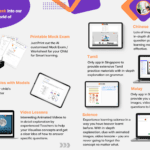As a dietary expert, I have observed that nutrition plays a significant role in cognitive function and academic performance, especially for students who struggle with staying focused and alert during exams.

In this guide, I will be sharing tips on how to nourish your brain for exam success. Commence with a well-balanced breakfast.
Skipping breakfast is a commonly made error by students, but it can severely impact your exam performance. After a night of sleep, your glucose levels are likely to be low, and your brain needs glucose to function effectively. A balanced breakfast that incorporates protein, whole grains, and healthy fats can provide your brain with the energy it requires to concentrate and stay focused.
Additionally, it is essential to snack on brain-boosting foods throughout the day. Foods that contain omega-3 fatty acids, such as salmon, walnuts, and chia seeds, are known to enhance cognitive function and memory.
Blueberries, which are packed with antioxidants, have been shown to enhance memory and concentration.
Keeping hydrated is equally important as dehydration can cause exhaustion, headaches, and difficulty concentrating. Drinking at least 8 glasses of water a day and avoiding sugary drinks and caffeine, which can lead to dehydration, is recommended.
Processed foods, such as chips, candy, and soda, can cause blood sugar spikes and crashes, resulting in fatigue and difficulty concentrating.
Whole foods, such as fruits, vegetables, and whole grains, should be prioritized as they provide a steady source of energy.
Skipping meals, particularly during exam season, can lead to low blood sugar levels and fatigue, impacting your ability to concentrate and retain information. Instead, aim to eat small, frequent meals throughout the day to keep your energy levels stable.
Eat Right, Score well!















